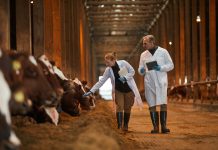Here, James Sopwith, managing director of adi Projects, discusses how hot demand for sustainable food production can be enhanced and developed further with core engineering skillsets
As the UK marches towards tackling issues of sustainability, agricultural emissions and greenhouse gases under net-zero targets, industries and consumers alike are beginning to make a number of changes.
With an ever-growing population, our dependency on resources such as food, water and nutrition has become an increasing pain point for institutions around the world. Indeed, the drive to deliver healthy diets and environmental sustainability forms one of the UN’s Sustainable Development Goals, of which many manufacturers and engineering firms, including ourselves, bound our responsible business actions to.
For manufacturers in this world, they must contend with an age-old dichotomy: how to speed up and improve product quality whilst driving down costs and reducing negative environmental impact.
Within this mix, you also have animal agriculture, which poses great implications for our planet. Consider how farm livestock currently produce more greenhouse gases each year than cars and vans put together. In fact, according to 2018 data from the UN Food and Agricultural Organization, the livestock on EU farms were responsible for the equivalent of 502m tonnes of carbon dioxide per year.
Taking aside the fact that this doesn’t include indirect greenhouse gas emissions either, and we can see that animal agriculture is responsible for approximately 9% of all greenhouse gas emissions in the UK and around 37% of all methane emissions globally.
Battling to limit this emissions background is the principles of science and innovation, and it is often the latter principle here that arises when both regulation and consumer demand reach an interesting tipping point. As net-zero ambitions edge ever closer, combined with increasing interest in alternative meat-free or plant-based diets, food manufacturers are keen to push forward with cleaner, more efficient and more nutritious production methods that don’t harm livestock or our environment.
Biotechnology makes its play
One of the methods that can help sustainable food manufacturing is biotechnology, which has the potential to provide us with safe, healthy and nutritious means of sourcing and consuming food through chemically infused technology. Reducing our damage to the world around us, new cellular food production methods limit our dependency on ‘natural’ resources such as meat, leather and fur, all of which can be replaced with acellular products including gelatin, casein and vanillin, thereby allowing us to make more eco-conscious choices in our everyday food consumption.
In practice, cellular agriculture has the potential to be a huge disrupter to the food production market. The development of animal tissue in bioreactors, provides a safer and more sustainable source of protein, that could fulfil the appetite of a projected 9bn population by 2050.
But design, investment and skilled support is just one of the factors needed to enable its transition into the ‘norm’. One of the biggest success stories so far, overcoming the odds, is meat substitute brand Quorn, which in 2018, saw a global sales growth of 7% to reach a staggering value of £220 million. Central to this has been investment in production, with the firm opening its biggest production facility in fall 2018.
Of course, none of that would be possible without dedicated in-house support – engineering capabilities that can fuse, implement and string together the physical machinery, software and processes that will manufacture the foods of the future. But with a rising skills shortage in the sector, impacted further by the pandemic, manufacturers are at more of a loss than ever before in meeting their production needs.
We’d therefore urge manufacturers to put their faith in those companies which can offer specialist support at scale, 360-degree partners that both invest in the future of engineering as well as offer expertise across every major market sector, ensuring no break in the supply chain. Since both innovation and design underpin engineering philosophies, its match made in heaven for manufacturers looking to deploy both science and food production expertise to create foods that enrich us on a more sustainable basis. At adi, we’ve spent years incrementally adding to our skillsets, keeping our ears to the ground to deliver over 30 specialist engineering disciplines, including leading solutions to the food and beverage market. Only by taking this approach can firms put themselves in a prime position to take advantage of the next wave of food trends, as rises in veganism, plant-based foods and more have already challenged manufacturers to adapt their offerings to market.
The flipside of this, of course, is consumer demand. If regulations are edging us ever closer to a carbon free economy, it is still perhaps the issue of customer attitudes and tastes that remain a sticking point in sustainable food production. The UK’s market for meat substitutes is already worth over 400m euros, however, according to recent figures from IFF, a leading innovator of taste, scent, and nutrition, just 24% of people polled said they would happily try cell-based agricultural products. So, despite plant-based foods and meat alternatives showing up ever increasingly on our supermarket shelves, it seems the verdict is still out on food that perhaps still has sour tagline taste of ‘genetically modified’.
Collaboration and acceptance
Food innovators no doubt hold the key to transforming our lives as we know it, building a more sustainable future that reduces our dependency on ever-more frowned upon tactics in meat production. Science has come a long way, but it is now time for manufacturers, consumers and the world of engineering to come together to collaborate and be ready for the next wave of food revolution, which despite some opposition, is already engineering a better future for all.











